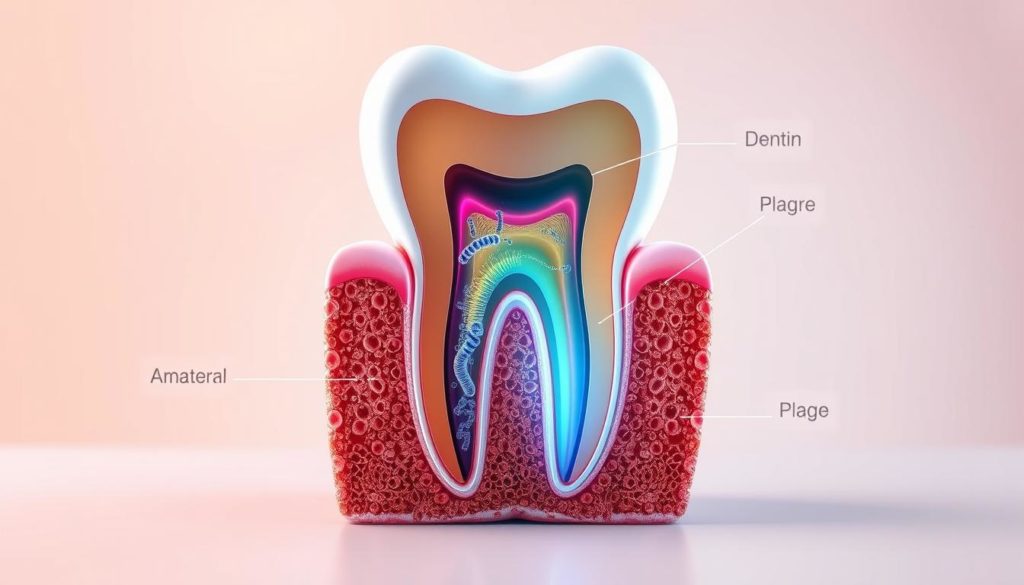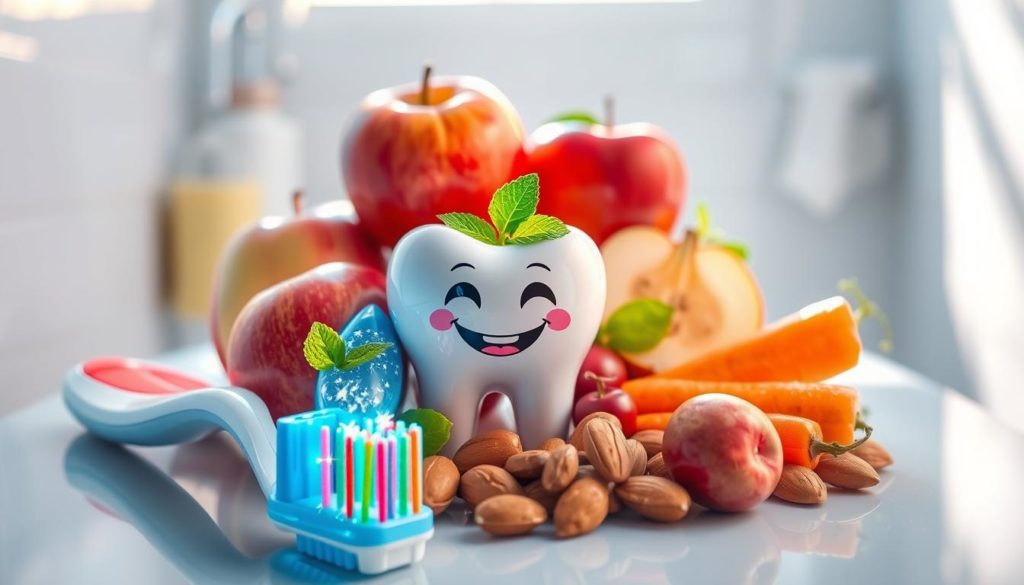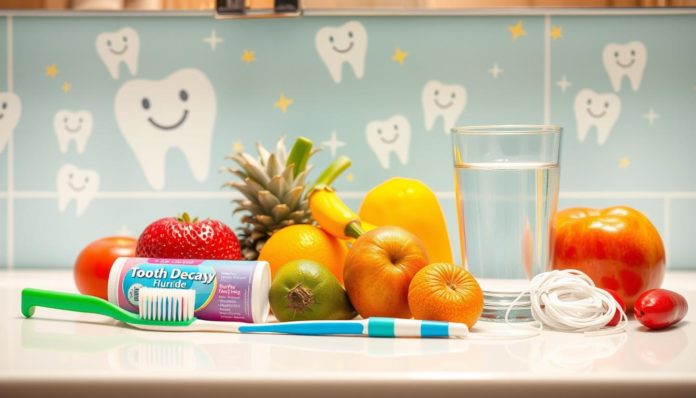Did you know nearly 90% of adults in the United States have had a cavity by 34? This shows how important it is to take care of your teeth. Preventive dentistry and good dental hygiene are key.
By avoiding tooth decay and keeping your smile bright, you can make a big difference. A good oral care routine, the right diet, and regular dental visits are crucial. These steps help keep your teeth healthy.
We’ll explore ways to prevent tooth decay. This includes picking the best toothbrush, using fluoride, and learning new dental care methods. These tips will help you keep your teeth healthy and prevent cavities.
Understanding Tooth Decay
Tooth decay is a common problem worldwide. It’s important to know what causes it and how it progresses. This knowledge helps us take better care of our teeth and prevent cavities.
What Causes Tooth Decay?
Tooth decay comes from several factors. Bad dental habits and a diet full of sugars are big contributors. Bacteria in our mouths also play a role. They make acids that eat away at our tooth enamel.
By taking good care of our teeth and eating right, we can lower our risk. This can make a big difference.

Stages of Tooth Decay
Knowing the stages of tooth decay is key. It helps us see when we need to act fast:
- Initial Demineralization: This is the first sign. It’s when minerals start to leave the enamel because of acid from bacteria.
- Enamel Erosion: If the problem gets worse, tiny holes start to form in the enamel.
- Dentin Decay: When the enamel wears down, the decay hits the dentin. This makes our teeth more sensitive.
- Pulp Damage: If we don’t stop it, the decay can reach the pulp. This causes a lot of pain and can harm the root.
- Abscess Formation: The worst case is when decay leads to an infection. This forms an abscess under the tooth.
As tooth decay moves through these stages, it’s clear why regular dental visits and prevention are so important.
The Importance of Dental Hygiene
Keeping your teeth and gums healthy is key. A good oral health routine does more than just make your breath fresh. It’s vital for preventing cavities and keeping your mouth healthy. Let’s explore daily practices and the best toothbrush to choose.

Daily Oral Care Routine
Everyone needs a good daily oral care routine. Here’s a simple yet effective way:
- Brushing: Brush your teeth twice a day with fluoride toothpaste. Hold your brush at a 45-degree angle to your gums and brush in circles.
- Flossing: Floss once a day to clean between your teeth and under your gums, where your toothbrush can’t reach.
- Mouthwash: Use mouthwash for extra protection against bacteria and to keep your breath fresh.
Choosing the Right Toothbrush
Finding the right toothbrush is important for your oral health. Here are some tips:
- Bristle Type: Choose soft bristles to protect your enamel and gums.
- Head Size: Pick a toothbrush with a small or medium head for better access to hard spots.
- Handle: Make sure the handle is comfortable in your hand for easy brushing.
By sticking to a daily oral health routine and picking the right toothbrush, you can greatly improve your dental hygiene. This helps prevent cavities and keeps your mouth healthy.
Effective Tooth Decay Prevention Techniques
Keeping your teeth healthy is key to a great smile. Using fluoride products is a top way to prevent tooth decay. Fluoride makes your enamel strong, fighting off acid attacks from plaque and sugars. Brushing with fluoride toothpaste is a simple yet powerful step.
Dental sealants are also great for preventing cavities. They act as a shield for your teeth, especially molars, which are more at risk. Getting sealants applied is easy and can greatly lower your risk of tooth decay.
Don’t forget about interdental cleaning. Brushing only covers the surface of your teeth. Flossing gets into the spaces between, removing food and plaque that brushes can’t. Regular flossing is essential for clean teeth.
| Prevention Technique | Benefits |
|---|---|
| Fluoride Treatment | Strengthens enamel and prevents cavities |
| Dental Sealants | Protects against decay in molars and premolars |
| Interdental Cleaning | Removes plaque and prevents gum disease |
Adding these techniques to your daily routine can boost your dental care. But don’t forget the importance of professional dental care. Regular check-ups help catch and treat problems early.
Cavity Prevention for Different Age Groups
It’s important to know that cavity prevention changes as we age. We need to tailor dental care for kids and adults. This ensures everyone has good oral health.
Children’s Dental Care
Teaching kids good dental habits early is key. Make sure they brush twice a day with fluoride toothpaste and floss every day. Limiting sugar from snacks and drinks helps prevent cavities too.
Regular dental visits are also crucial. They help catch and prevent problems early on.
Adult Dental Health Tips
Adults need to pay more attention to their teeth as they age. Brushing, flossing, and using mouthwash are important. Drinking water and eating a balanced diet also help keep teeth healthy.
Going to the dentist regularly is essential. It helps with cleanings and catching any dental problems early.
| Factors | Children’s Dental Care | Adult Dental Health |
|---|---|---|
| Brushing Frequency | Twice a day | Twice a day |
| Flossing | Daily, under supervision | Daily |
| Dietary Recommendations | Limit sugar intake | Balanced diet with low sugar |
| Dental Visits | Every 6 months | Every 6 months |
By following age-specific dental habits, kids and adults can keep their teeth healthy and cavity-free for years.
The Role of Fluoride in Tooth Decay Prevention
To keep your teeth healthy, it’s important to know how fluoride works.
Fluoride is a natural mineral that makes tooth enamel stronger. It also helps fix early decay. This is called remineralization. It makes enamel better at fighting off acid attacks from bacteria. Getting fluoride treatments regularly boosts your dental care routine.
- Tap water: Many places in the U.S. have fluoridated water. It’s a simple way to get fluoride every day.
- Dental products: Toothpaste and mouth rinses with fluoride are easy to use. They help keep your teeth healthy.
- Professional fluoride treatments: Dentists can give you treatments with more fluoride. They’re great for people who get cavities often.
Adding fluoride to your dental care routine helps protect your teeth. You can use products at home or get treatments from your dentist. This method not only stops cavities but also keeps your smile bright and healthy for years.
Healthy Diet for Healthy Teeth
Keeping a healthy diet is key for strong teeth. Good nutrition boosts overall health and oral health. It helps prevent tooth decay and keeps your teeth clean. Here are some tips for a diet that supports healthy teeth.
Foods to Eat
Eat these foods to keep your teeth healthy and prevent decay:
- Dairy Products: Milk, cheese, and yogurt are full of calcium, which strengthens teeth.
- Fruits and Vegetables: Crunchy foods like apples and carrots help clean your mouth by stimulating saliva.
- Nuts and Seeds: Almonds and sesame seeds are good for your teeth because they’re full of minerals and vitamins.
- Leafy Greens: Spinach and kale are rich in vitamins and minerals that help your teeth.
- Water: Drinking water, especially fluoridated water, helps wash away food and bacteria.
Foods to Avoid
Some foods are bad for your teeth and can cause decay. Stay away from these:
- Sugary Snacks and Beverages: Foods like candies and sodas can cause cavities because they feed bad bacteria.
- Starchy Foods: Foods like chips and pasta can turn into sugars that harm your teeth.
- Acidic Foods and Drinks: Things like citrus fruits and vinegar can wear down your enamel.
- Sticky Foods: Foods like caramel and dried fruits can stick to your teeth, making them hard to clean.
- Alcohol: Drinking too much can make your mouth dry, which lets bacteria grow.
By eating the right foods and avoiding the wrong ones, you can greatly improve your oral health. This will help you keep your teeth in great shape.
Benefits of Regular Dental Check-ups
Regular dental check-ups are key to keeping your oral health in top shape. These visits help catch problems early, which is a big part of keeping your teeth and mouth healthy. Dentists can spot cavities, gum disease, and other issues before they get worse.
Another big plus of dental visits is the professional cleaning. This cleaning gets rid of plaque and tartar that brushing and flossing might miss. It’s a must to stop tooth decay and gum disease from getting worse.
Dental check-ups are not just about your teeth. They also check your gums, tongue, and throat. This helps keep your whole body healthy. By going to the dentist regularly, you can catch and fix any oral health problems fast.
Here’s a quick rundown of the main benefits:
| Benefit | Description |
|---|---|
| Early Detection | Spot cavities, gum disease, and other issues early on. |
| Professional Cleaning | Get rid of plaque and tartar for a cleaner, healthier mouth. |
| Comprehensive Assessment | Check your teeth, gums, tongue, and throat thoroughly. |
| Total Health Maintenance | Regular visits help prevent dental diseases and keep you healthy overall. |
Innovative Preventive Dentistry Methods
Dentistry is changing fast, introducing new ways to stop tooth decay. These new methods are improving dental care and making treatments better and easier to get.
New Technologies in Dental Care
New ideas in dentistry are changing how we care for our teeth. Digital X-rays cut down on radiation and intraoral cameras show teeth and gums clearly. Laser dentistry is also getting better, making fillings and plaque removal painless.
Preventive Treatments to Consider
There are many ways to prevent cavities, like antimicrobial varnishes and sealants. These are applied during check-ups to lower cavity risk. Fluoride treatments are still key, but silver diamine fluoride is even better for high-risk patients.
Laser tech is also helping find problems early. This means we can fix issues before they get worse. Keeping up with these dental advancements helps you choose the best care for your teeth.
FAQ
What causes tooth decay?
Tooth decay is mainly caused by bacteria in your mouth. When you eat sugary foods and drinks, these bacteria make acids. These acids attack the tooth enamel, causing cavities. Not brushing well and eating too much sugar also increase the risk.
What are the stages of tooth decay?
Tooth decay goes through several stages. First, plaque builds up. Then, the enamel erodes, followed by dentin decay. Next, the pulp gets damaged, and finally, an abscess forms. Catching it early can stop it, but later stages need dental help.
What should my daily oral care routine include?
Brush your teeth twice a day with fluoride toothpaste. Floss to remove plaque between teeth. Rinsing with mouthwash helps too. Brushing and flossing prevent cavities and keep your mouth healthy.
How do I choose the right toothbrush?
Choose a toothbrush with soft bristles to protect your gums and enamel. The head should fit your mouth well, letting you clean all areas. Electric toothbrushes are also good for cleaning.
How does fluoride help in preventing tooth decay?
Fluoride makes your enamel stronger and more resistant to acid. It also helps repair early decay. Using fluoride in toothpaste, mouthwash, and water is very effective.
What foods are good for my teeth?
Eat foods high in calcium and phosphates like dairy, nuts, and some veggies. Crunchy fruits and veggies like apples and carrots clean your teeth. They also make saliva, which fights acids.
What foods should I avoid to prevent tooth decay?
Avoid sugary snacks, sticky candies, and acidic foods. Soda, fruit juices, and sweet baked goods are bad for your teeth. Eat them less often.
Why are regular dental check-ups important?
Regular dental visits catch problems early. Your dentist can clean your teeth better than you can at home. This keeps your teeth and mouth healthy.
What are some innovative preventive dentistry methods?
New tech like laser diagnostics and antimicrobial varnishes are changing dentistry. They help find decay and fight bacteria better. This means better care for your teeth.


